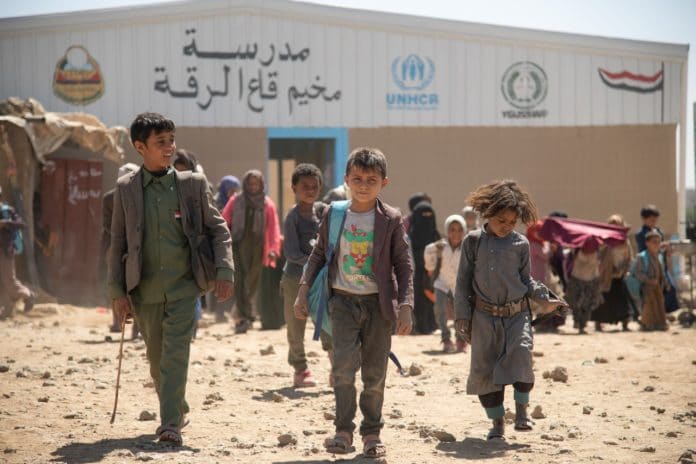Unearmarked funding from the Nordic countries helps UNHCR continue protecting and assisting Yemenis caught in one of the world’s largest but most underfunded crises.
Nabiha, 38, serves her children tea and bread and counts the money left in her pocket as they sit in a settlement some 185 kilometres away from their hometown of Al-Mokha. More than half a decade has passed since Nabiha walked down the winding streets of Al-Mokha and smelled the salty sea breeze mix with the wafting scent of freshly roasted coffee that the city was known for before it became known for war.
7 years of conflict

This spring marks seven years since the escalation of the conflict in Yemen, which claimed the life of Nabiha’s husband, who was killed in an explosion, and which forced Nabiha and her family to flee. Many Yemenis, including Nabiha and her mother, daughter and two sons, have fled two or three times as the frontlines of the conflict have shifted.
“I was living very close to the fighting. I had to move to another area because families were killed and injured all around us. We moved three times from one neighborhood to another to avoid bullets and airstrikes,” says Nabiha.
Today, two out of three Yemenis – or 20 million people – are in need of humanitarian assistance for survival. Already a poor country before the conflict, the situation in Yemen has rapidly deteriorated into one of the world’s largest humanitarian crises.
4 million internally displaced
Since 2015, over four million Yemenis have been forced to flee their homes and seek safety elsewhere in the country. More than half of the internally displaced are just one step away from famine, and many live miles away from sources of clean water or sanitation facilities. Nearly four out of five Yemenis displaced within the country are women and children.
Alongside the widespread insecurity around access to food, many Yemenis also live in a highly precarious housing situation. After having been forced to flee time and time again due to shifting frontlines in the conflict, many Yemenis also face threats of eviction from the temporary homes they have established.
Additionally, over 100,000 refugees and asylum-seekers – primarily from Somalia and Ethiopia – are hosted in Yemen and face many of the same challenges as Yemenis on the move.
Despite the staggering needs, UNHCR, the UN Refugee Agency, has only received 12 per cent of the required funding for the Yemen appeal.

Unearmarked funding from the Nordic countries – and Swedish and Icelandic funding to UNHCR’s Yemen Response Plan – has been crucial for UNHCR to be able to respond to growing needs in a conflict that remains largely overlooked and underfunded.
“As the humanitarian situation in Yemen gets increasingly more dire, Nordic funding strengthens UNHCR’s capacity to provide shelter, protection and assistance to the many displaced persons in Yemen,” says Henrik M. Nordentoft, UNHCR’s Representative to the Nordic and Baltic Countries. “Although the humanitarian crisis in Yemen is among the world’s largest, it is severely underfunded, and unearmarked funding is crucial in order to be able to provide the much needed aid and protection.”
Before his death, Nabiha’s husband had worked as a nurse at a local hospital and had taught Nabiha basic nursing skills. Now as the head of the household and responsible for supporting her family, Nabiha works shifts at local health clinics and as a housekeeper and struggles to make ends meet to provide for her mother and children.

As humanitarian needs have grown in Yemen over the past years, UNHCR has expanded its cash assistance programme. Unlike Nabiha, 92 per cent of all Yemenis forced to flee have no source of income at all and rely solely on humanitarian assistance such as cash assistance from UNHCR to survive. UNHCR’s cash assistance programme in Yemen now reaches more than a million people each year.
In addition to the cash assistance programme, UNHCR delivers shelters to respond to the difficult housing situation of displaced Yemenis. UNHCR also provides psychological support and runs programmes specifically targeting women and children to provide protection and prevent violence.
“I want my children to be independent,” says Nabiha. “They are excellent in their studies. I want them to rely on themselves when I die. I want a better life for them; better than mine.”
Denmark as a donor
Denmark is one of UNHCR’s top ten donors and contributed USD 101.2 million to UNHCR in 2021. Approximately 34 per cent of Denmark’s contribution was unearmarked, allowing UNHCR to respond rapidly to emergency situations and underfunded crises.
Finland as a donor
Finland is an important partner and donor to UNHCR and in 2021, Finland provided around USD 26.6 million to UNHCR. Approximately 31 per cent of Finland’s funding was unearmarked, allowing UNHCR to respond rapidly to emergencies and underfunded crises.
Iceland as a donor
Iceland is a reliable donor to UNHCR and contributed USD 1.9 million in 2021, including USD 500,000 in unearmarked funding. Unearmarked funding makes it possible for UNHCR to rapidly respond to both emerging and protracted crises.
In 2021, Iceland donated over USD 383,000 to UNHCR’s 2021-2022 Yemen Response Plan.
Norway as a donor
Norway is among UNHCR’s top ten donors and provided USD 107.4 million to UNHCR in 2021. 74 per cent of Norway’s contribution was unearmarked, making Norway the biggest government donor of unearmarked funding in 2021.
Sweden as a donor
Sweden is among UNHCR’s top ten donors and the biggest multi-year donor of unearmarked funding. In 2021, Sweden contributed USD 122.9 million to UNHCR, of which 61 per cent was unearmarked.
In 2021, Sweden donated over USD 2 million to UNHCR’s 2021-2022 Yemen Response Plan.
On 16 March 2022, Sweden co-chaired an international pledging conference on the humanitarian crisis in Yemen together with Switzerland and the UN in order to mobilize continued support.






